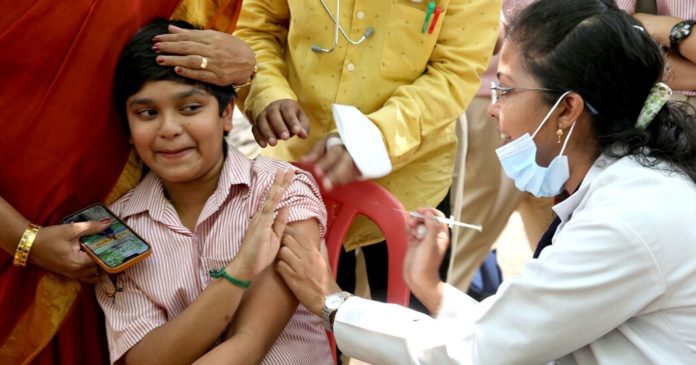NEW DELHI — Two of India’s biggest vaccine manufacturers have slashed the prices of their coronavirus vaccines by more than half for private hospitals.
The companies, the Serum Institute of India and Bharat Biotech, both announced price cuts on Saturday, a day after India had said that it would expand access to booster doses for most adults, but only at private health facilities and for paying recipients.
“We are pleased to announce that after discussion with the central government, S.I.I. has decided to revise the price of Covishield vaccine for private hospitals,” Adar Poonawalla, the chief executive of Serum Institute, said on Twitter using the company’s brand name for the AstraZeneca-Oxford vaccine.
Minutes later, Suchitra Ella, a co-founder of Bharat Biotech, made a similar announcement about Covaxin, the first coronavirus vaccine created in India, saying the shot would be available at private hospitals at 225 rupees, or about $3, a price reduction of more than 80 percent.
The government of Prime Minister Narendra Modi has been under pressure to make the vaccines more affordable. But critics said that the government’s decision to require Indians to pay for booster doses would place poorer people at a disadvantage, especially in rural areas, where there are fewer private health facilities.
“The central feature of this new policy is discrimination by design,” Abhishek Singhvi of the Indian National Congress, the main opposition party, said on Sunday. “Are you suggesting that you do not care for the rural population? Are you suggesting that you do not bother about the less privileged?”
India’s leading health experts have also raised questions about the policy. “What happens to poor persons who are under 60 and may have fading immunity? We do not know how many of them are at risk at present or will be in the near future,” Dr. K. Srinath Reddy, the president of the Public Health Foundation of India, wrote in an opinion article on Saturday.
Both the Serum Institute, the world’s largest vaccine maker, and the government of India have long faced criticism about the pricing and availability of vaccines. During a devastating second wave of Covid-19 last April, Mr. Poonawalla and his company were castigated by politicians and the public for raising the price of doses.
Last June, Mr. Modi’s government said it would take over procurement of vaccines, ending its heavily criticized policy of leaving individual states to negotiate directly with vaccine manufacturers over prices, at a time when shots were in short supply globally.
On Sunday, the government said that states had received more than 1.8 billion doses since early 2021, and had more than 174 million unused shots on hand.
India’s Health Ministry said on Friday that booster shots would be available for people ages 18 to 60 starting on Sunday, but that people must wait at least nine months between their second and third doses. One reason to approve boosters for more people, experts said, is that many Indians who have received only two doses are finding it difficult to travel abroad without booster certificates. India lifted its ban on international commercial flights last month.
The country has fully vaccinated 61 percent of its population, and 1.7 percent of people have received a booster, according to the Our World in Data project at the University of Oxford. Most were inoculated with Covishield.
The daily average of cases has decreased by around 40 percent over the past two weeks, according to the Center for Systems Science and Engineering at Johns Hopkins University, as India emerges from an Omicron surge. The average number of deaths has plummeted 92 percent over the same period.
Experts say that even though India has weathered the latest surge, risks remain. “If a new variant emerges with higher virulence or triggers a large wave due to higher infectivity, the proportion of vulnerable adults may increase,” Dr. Reddy wrote in his article, adding, “The vaccine policy may be revisited if this happens.”
Sophie Downes contributed reporting.
Source : Nytimes











